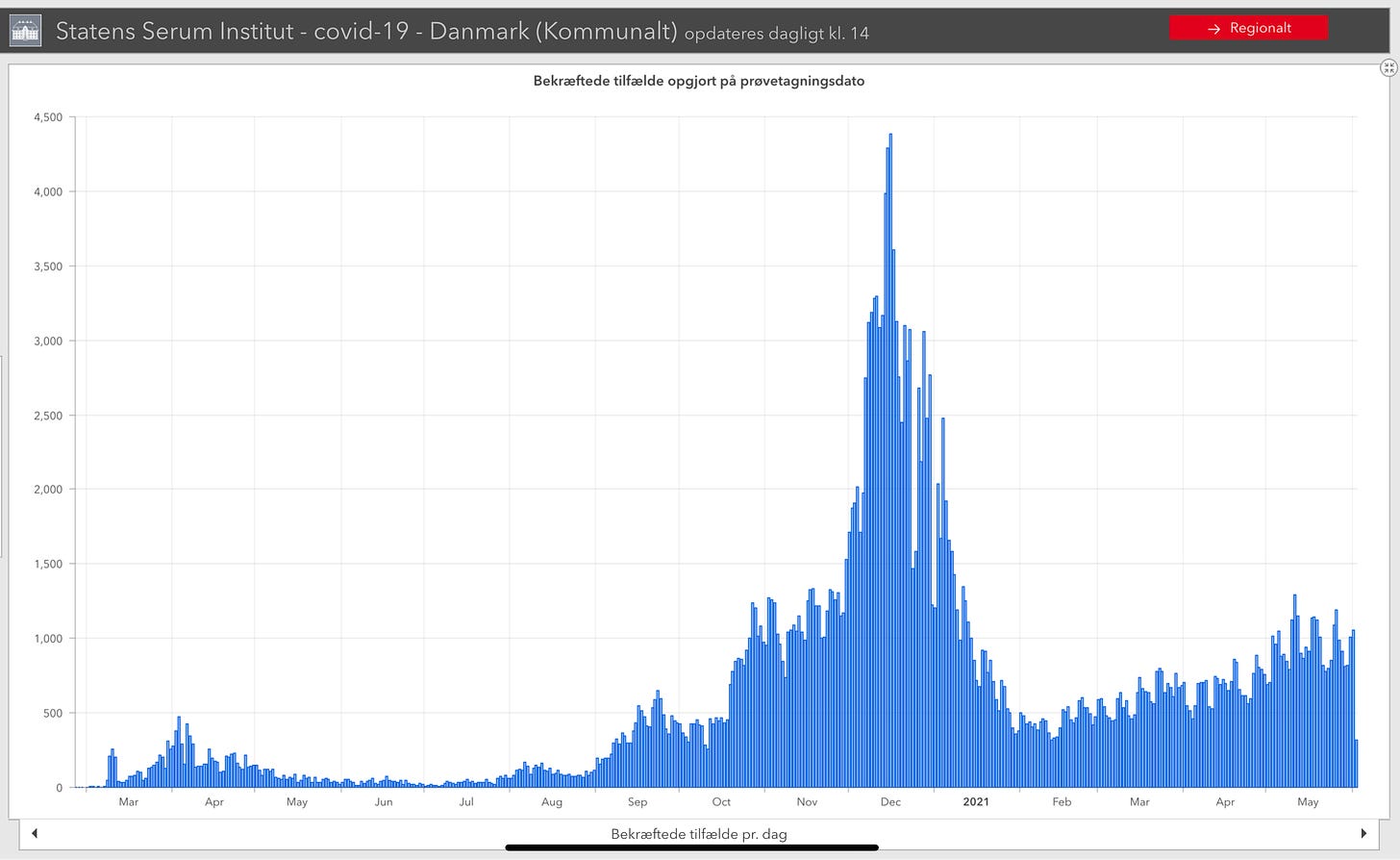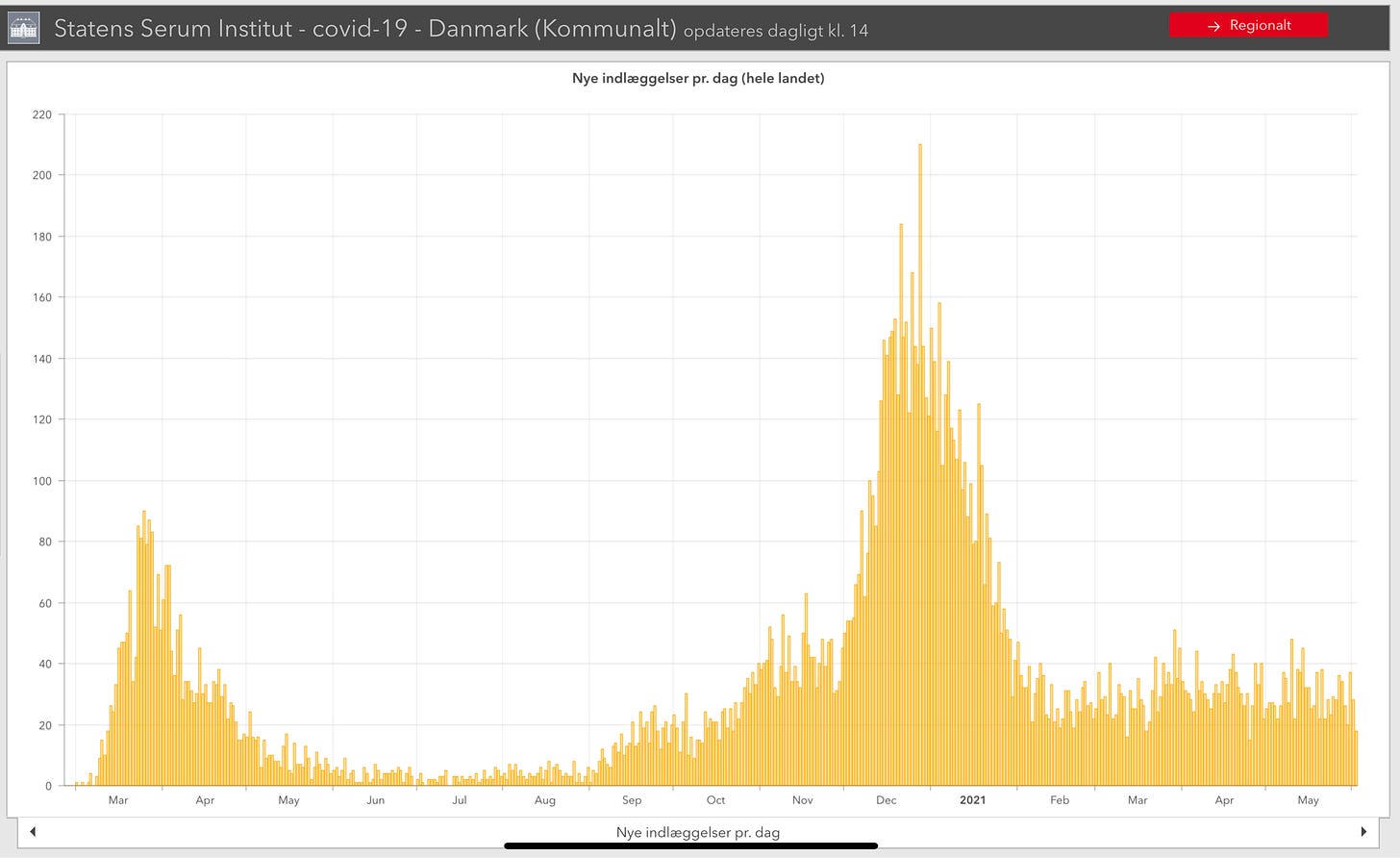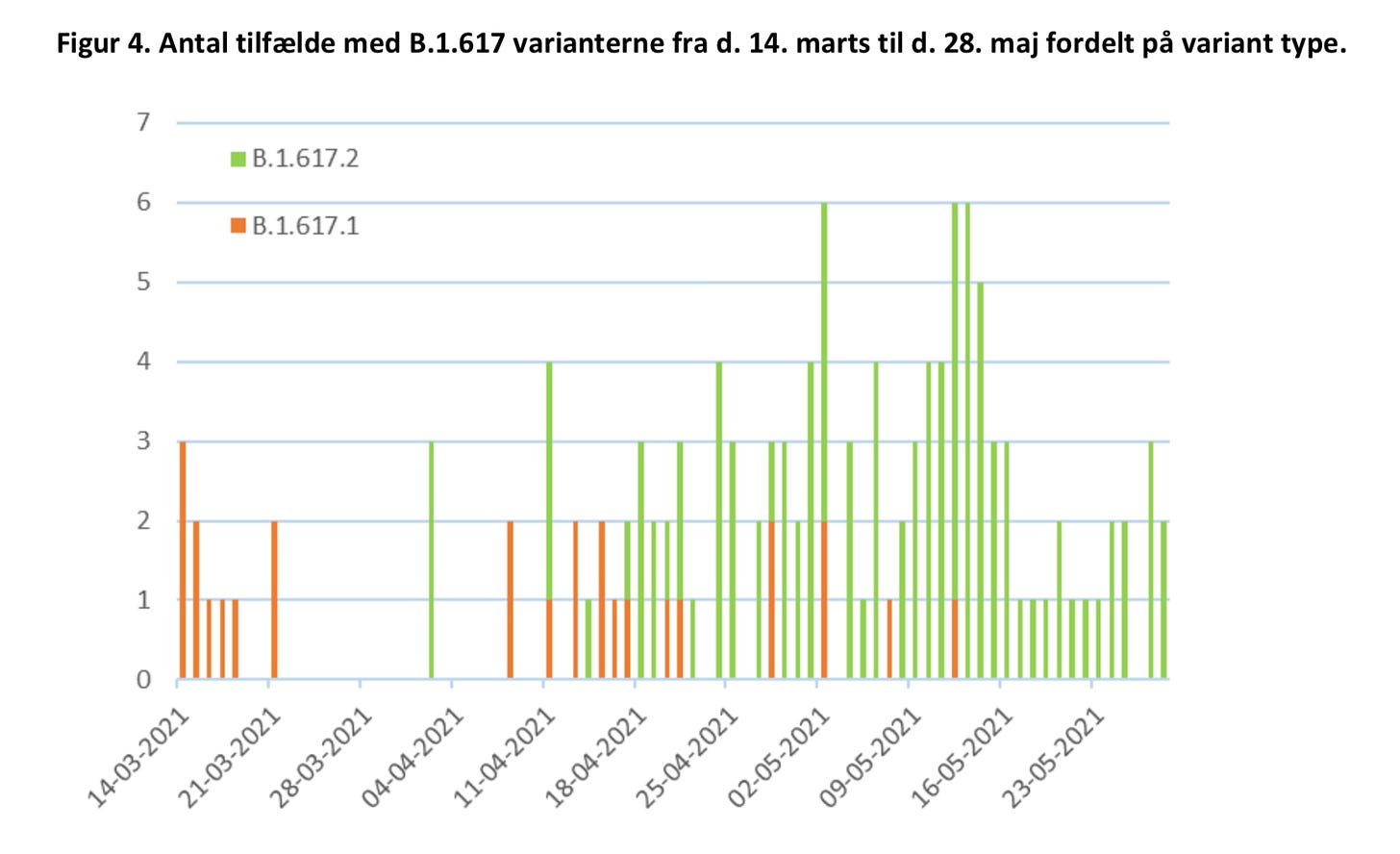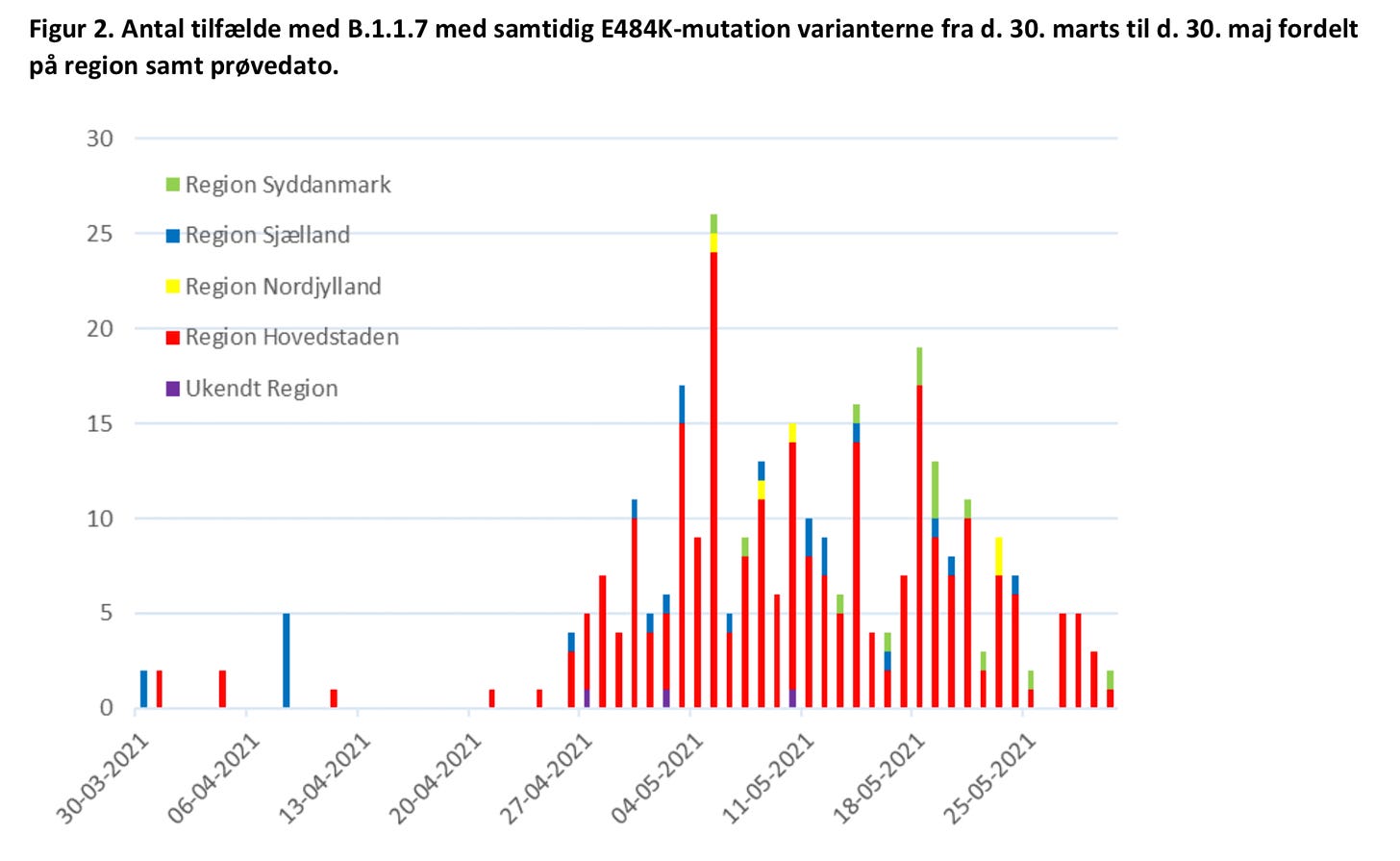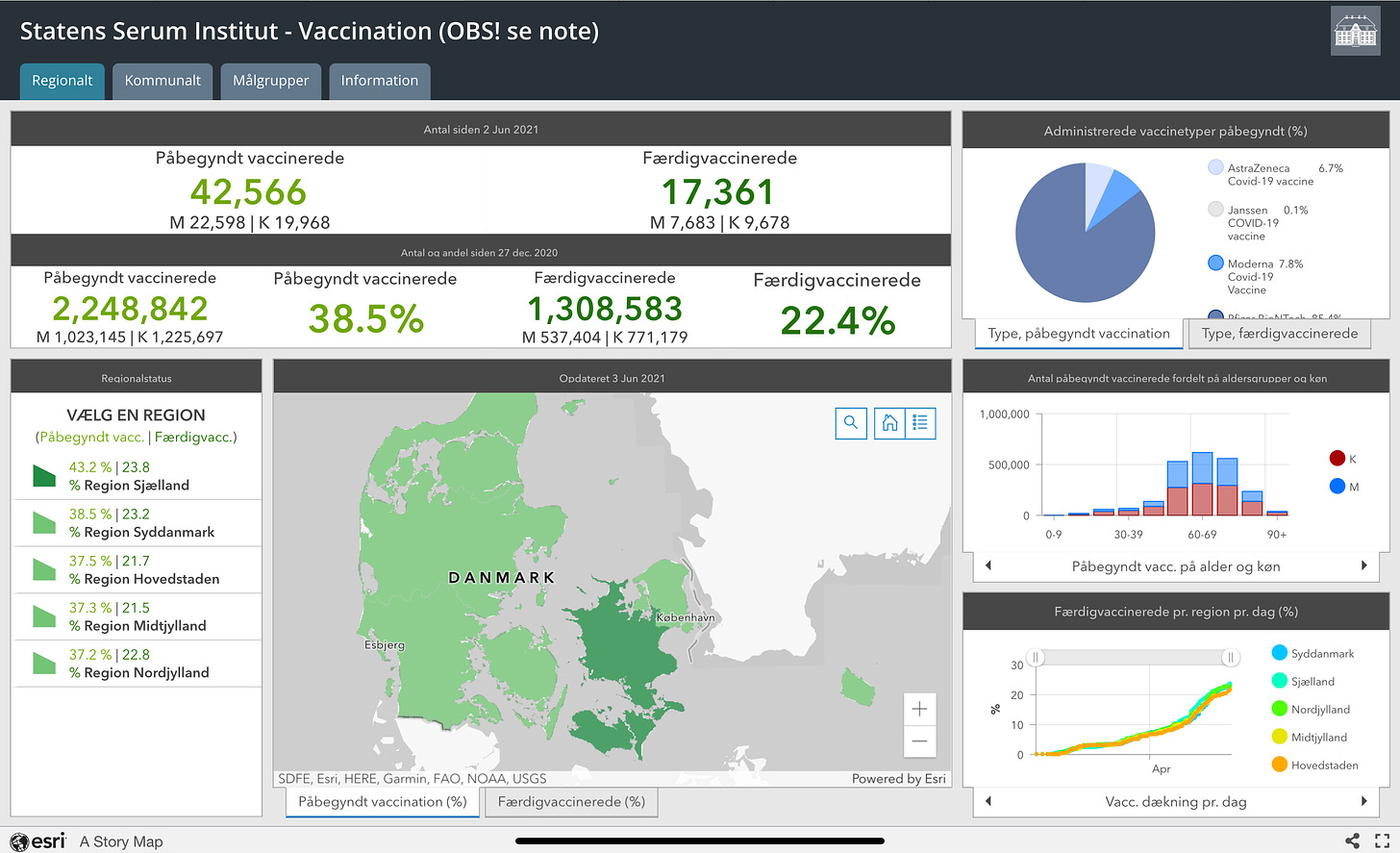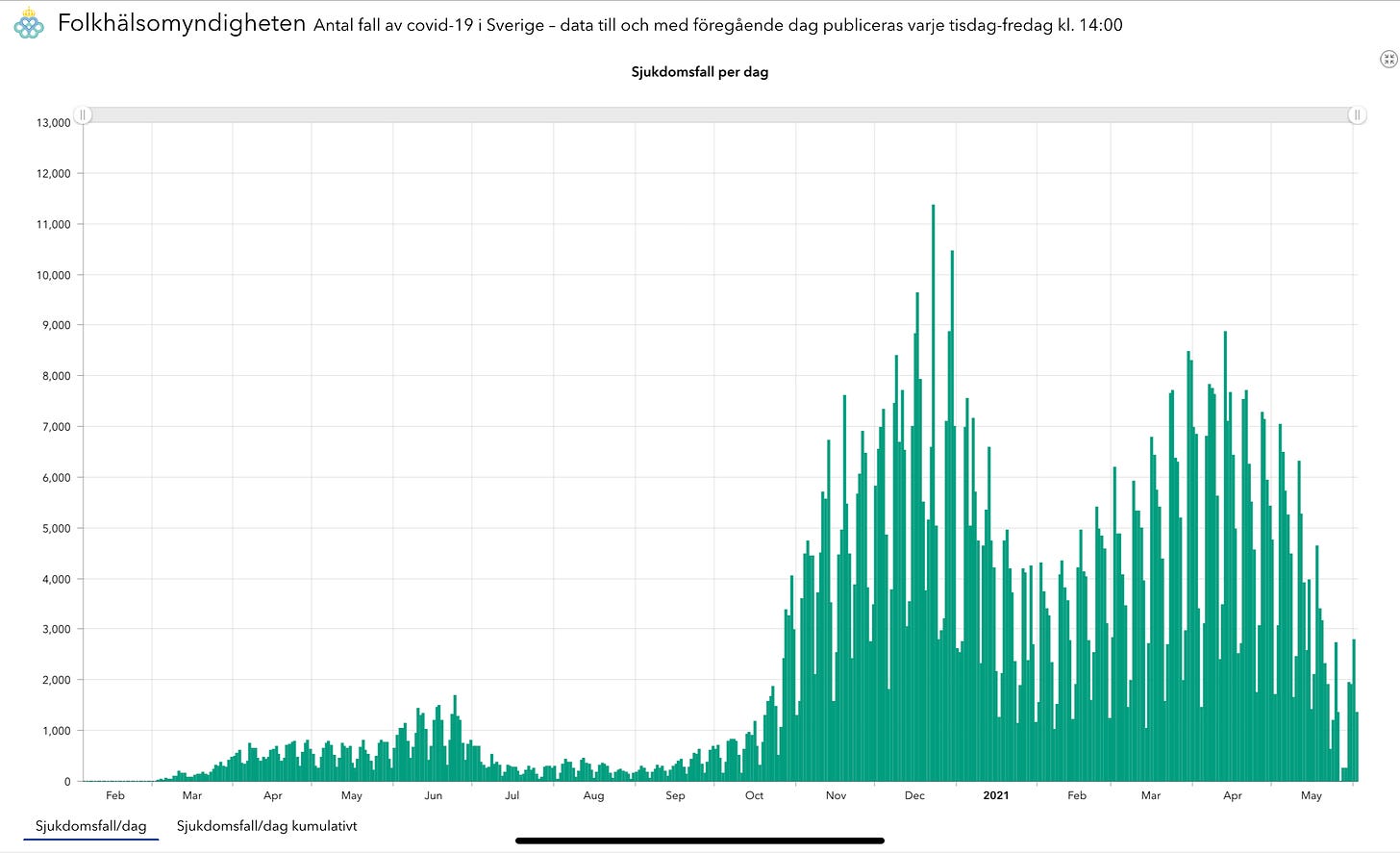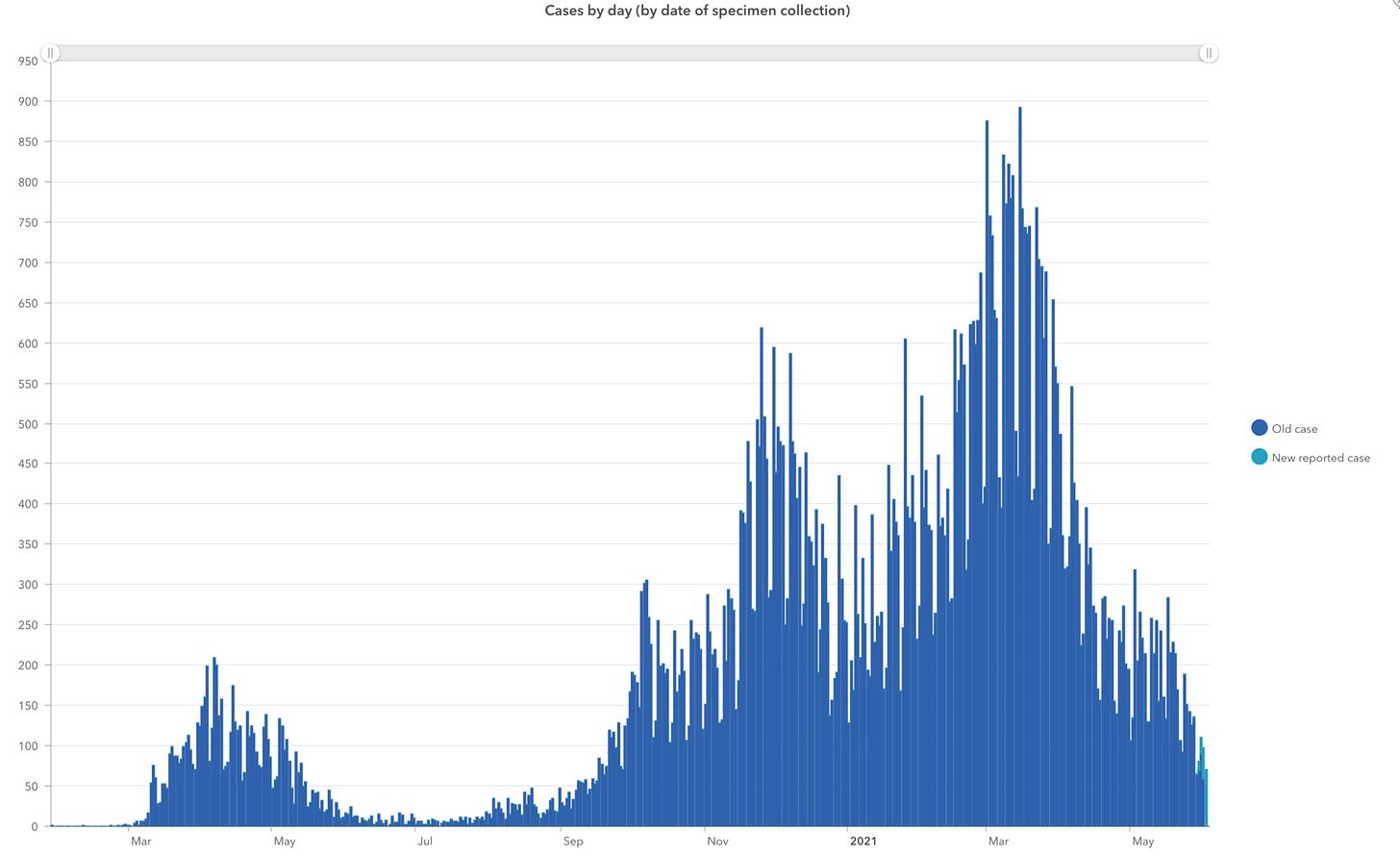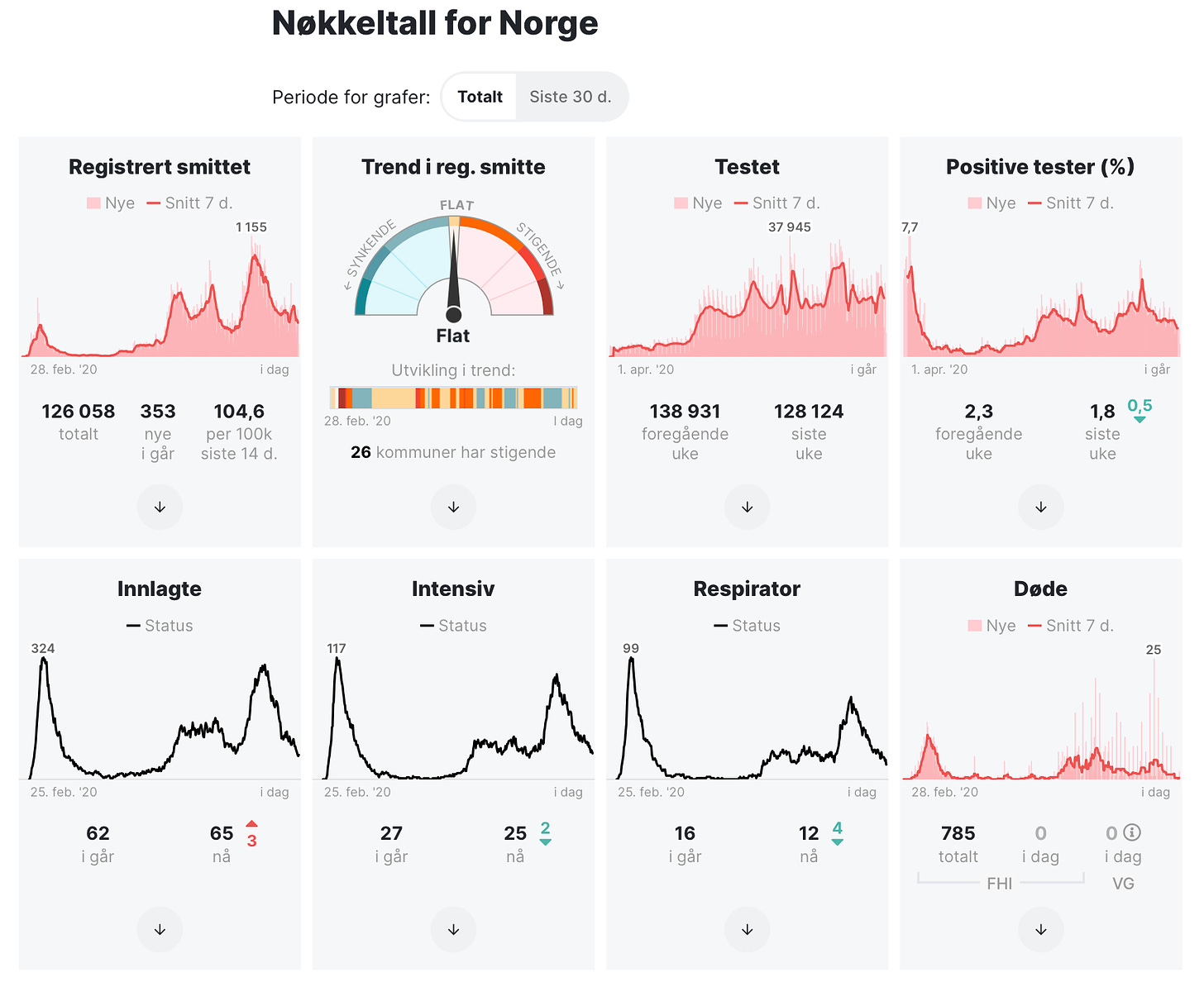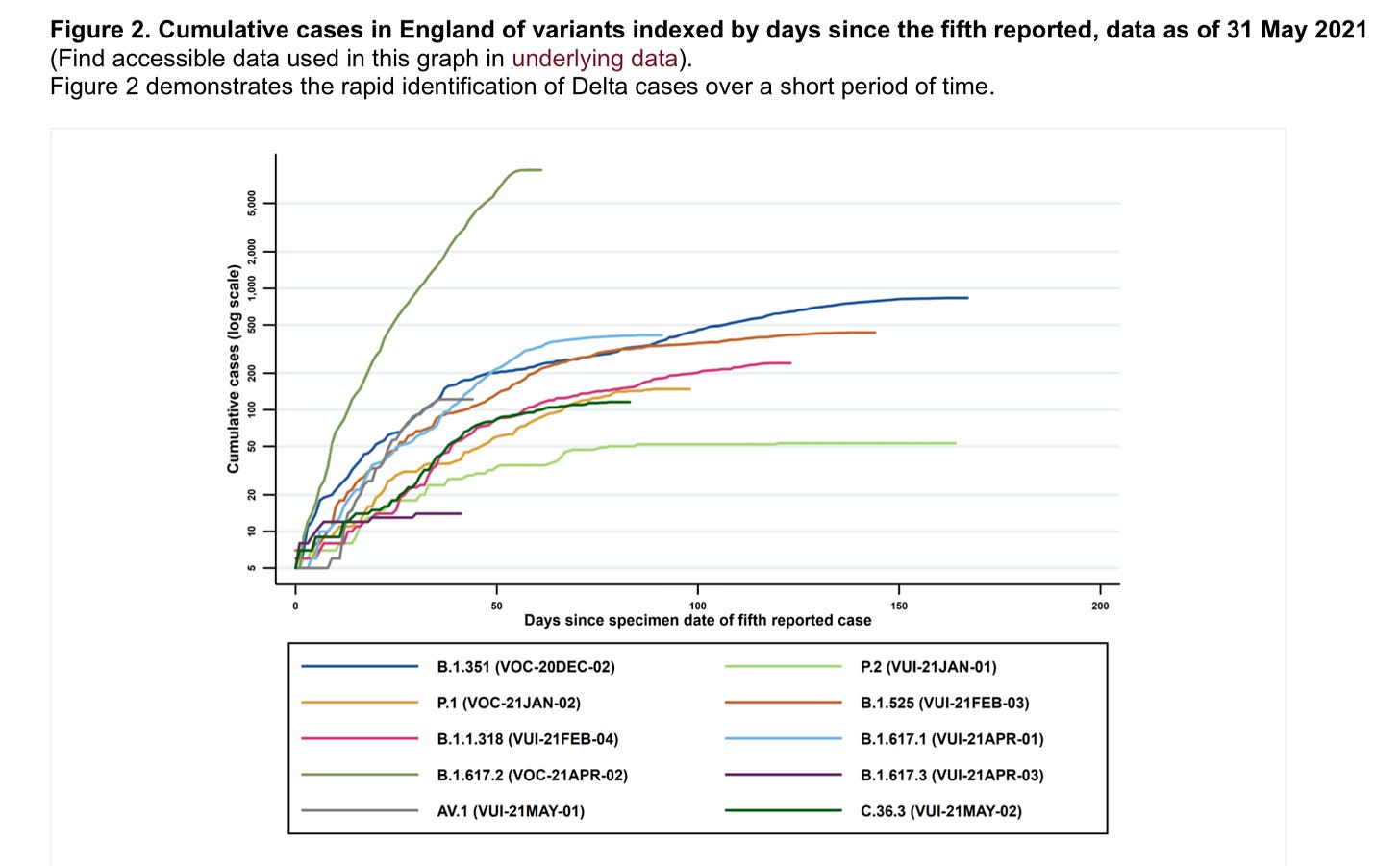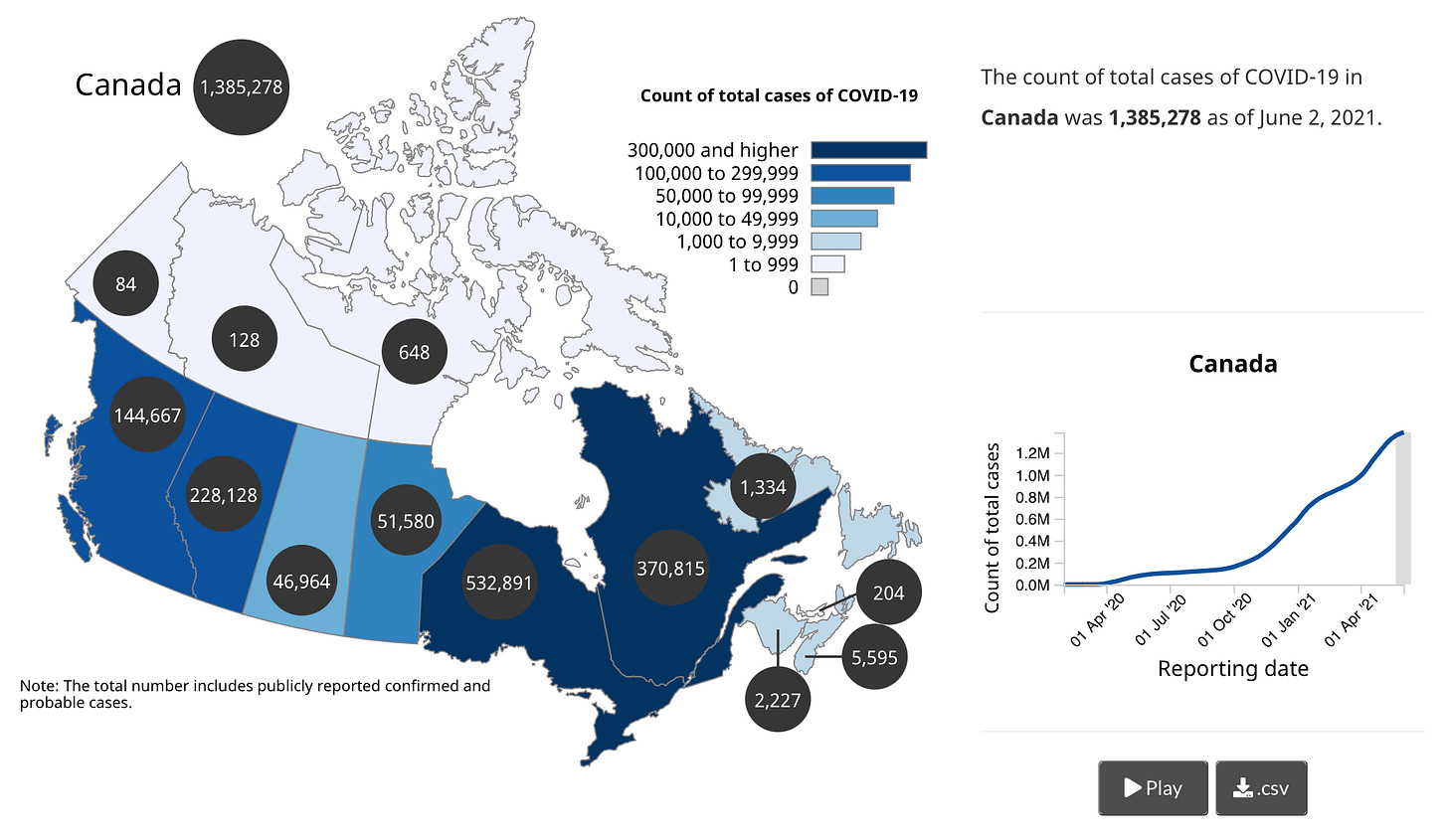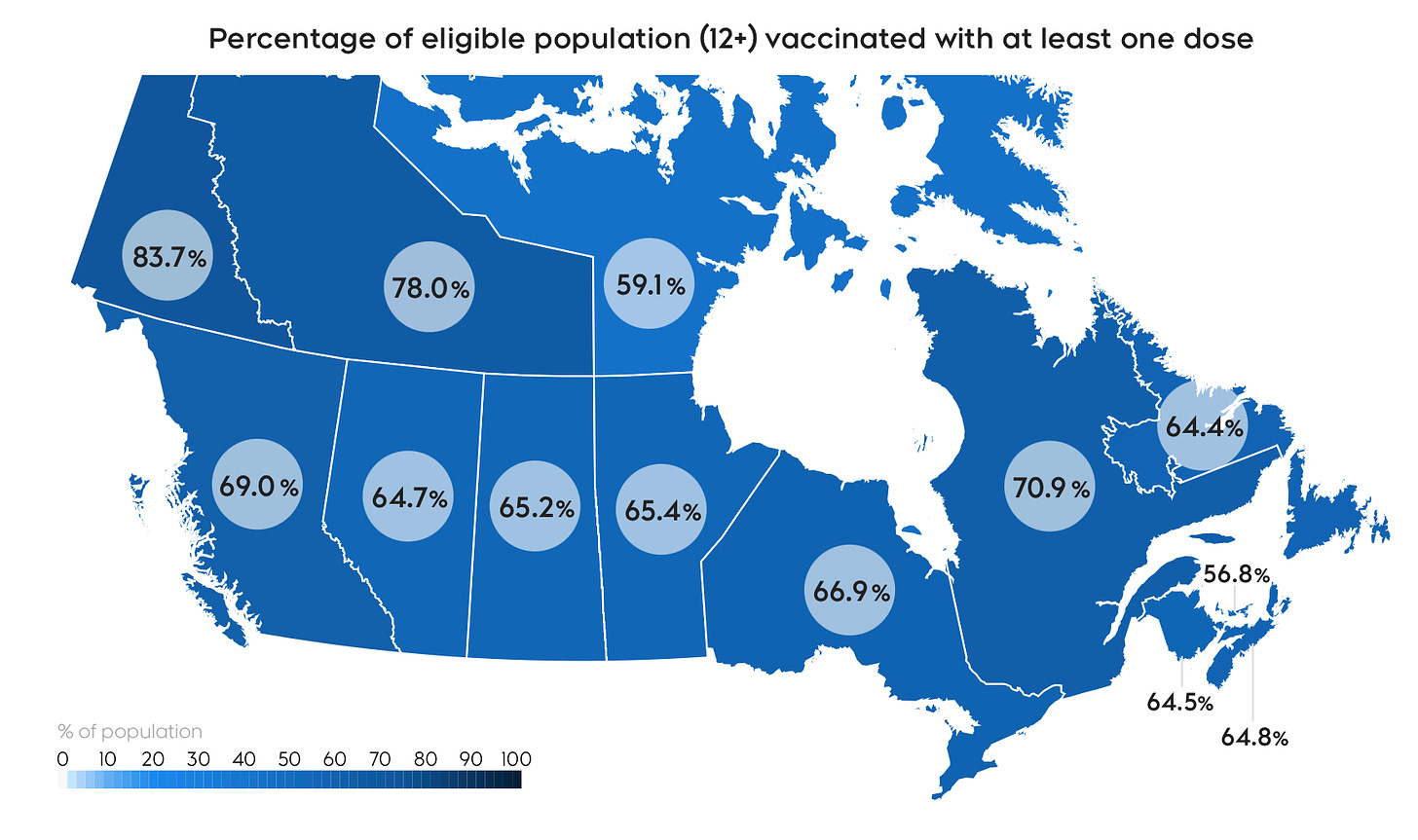The Evening Report - June 3rd
Denmark’s latest vaccine side effects report finds two new possible adverse impacts
🇩🇰
The Danish Medicines Agency says it has found one case of pericarditis, inflammation of the sac around the heart, and one case of myocarditis, swelling of the heart muscle, that might be linked to vaccination. In both cases, the vaccine administered was Pfizer/BioNTech. Other reports of myocarditis possibly related to the Pfizer vaccine have been reported in Israel and the United States. There have been no fatalities to date. The Danish Medicines Agency says while a link to the vaccine hasn’t been absolutely confirmed “it cannot be ruled out that the vaccine was a contributing cause.” There has been almost three million inoculations using the Pfizer vaccine in Denmark to date.
The agency has also received 103 reports of blood clotting after receiving a Pfizer vaccination, it has ruled out a link to the vaccine in 98 of those cases. In the remaining five, they suspect some of the blood clots came from how the needle was used during vaccination. Improper use can trigger blood clots in the arm where the injection was administered. However, two cases involved blood clots in the lungs.
Worth noting Lægemiddelstyrelsen has received 81 reports of deaths in a period after being vaccinated with Pfizer/BioNTech. After investigating each one, it found that “in all 81 cases, the Danish Medicines Agency's assessment is that it is less likely that there is a connection with the vaccine, and that it is overwhelmingly probable that the deaths are due to other conditions.”
-
Tomorrow Denmark’s Statsminister Mette Frederiksen will begin her vaccination process at the Øksnehallen vaccination center in Copenhagen.
Frederiksen issued a comment in a press release today.
“The Danes' support for being vaccinated remains very high. This is a reason for optimism. Tomorrow it is my turn to get my first shot. I look forward to all Danes being given the same opportunity. Because the vaccines are and will be our super-weapon against COVID.”
-
Denmark is continues to hold any new infection wave in check as it reports 1,028 COVID infections and one more coronavirus death in the last day.
Yesterday there were 513,169 total corona tests done, 126,808 PCR and 386,361 rapid, for a (PCR only) positivity percentage of 0.81%.
Givskud district in Vejle Kommune has been ordered to lockdown after infection numbers exceeded thresholds triggering an automatic shutdown.
Dragør Kommune just barely avoided having to close down as its infection numbers snuck in just under the limit forcing a mandated lockdown. The municipality had taken preemptive steps and closed libraries and daycares to wrestle its infection curve down to avoid a lockdown.
-
COVID hospitalizations (143) dropped (-13) while the number of infected in an ICU (34) and of those on a ventilator (23) also declined (both -3).m
-
The variant situation in Denmark continues to slowly gain ground but so far it is keeping in check any explosion of cases seen in other jurisdictions.
The numbers of the concerning Delta variant, B.1.617.2, continue to creep up with 100 confirmed cases of the mutation to date.
The other variant of concern to keep an eye on the B.1.1.7 strain with the E484K ‘escape’ mutation now has 299 confirmed infections. In all cases they are in Metro Copenhagen or the surrounding Sjælland region.
On the vaccination campaign, to date 2,248,842 1st dose vaccinations (38.5% of the population) have been administered while 1,308,583 people (22.4%) are now fully vaccinated.n
-
The Danish Finance Ministry said today that the digital vaccine passport app, coronapas, has now been downloaded more than one-million times. It debuted on app stores for Apple and Android devices last Friday.
🇸🇪
In its first update since last Thursday Sweden has added 8,520 infections and another 61 virus deaths since its last update.
To date 3,804,733 1st dose (46.5% of the population) and 1,595,703 2nd vaccine doses (19.5%) have been administered.
The Swedish Public Health agency is cautioning that COVID statistics “are still not yet complete” as they sort out the aftermath of shutting down the infectious disease database. The health authority says there is a reporting backlog and increased security has also caused some reporting problems. While it says it is dealing with a partial picture, at the moment, it is confident that the country’s infection curve is still trending downward.
The infectious disease database SmiNet was taken offline last week due to what it called attempts to access the database. While an official investigation by police and other Swedish authorized continues, the health agency said today “the ongoing investigation into last week's interruptions has not shown any sign that the data has fallen into the wrong hands. All indications are that someone wanted to point out a shortcoming which has now been remedied.”
-
A Swedish parliamentary committee has found that the government “failed” in its handling of the COVID pandemic. It concluded the government was slow to put in place a testing and contact tracing regime, failed to protect seniors, and fell short in in drawing clear lines of responsibility between the federal and regional authorities.
Committee Deputy Chair Hans Ekstrom told a hearing:
"It is clear that Sweden was not sufficiently prepared before [the pandemic] and we can learn from many of the underlying failures that have been identified.”
Sweden’s laissez-faire strategy sparked international debate as it not only refused to implement a lockdown but criticized countries that did. It relied on voluntary compliance from citizens to a series of recommendations that lacked any enforcement teeth. Sweden suffers by far the highest number of overall infections and coronavirus deaths than all of its Nordic neighbours combined. It only abandoned its strategy late in a deadly second infection wave, when Sweden’s King, in a Christmas address, said the government’s strategy had failed and too many Swedes had died as a result.
-
Region Stockholm has opened vaccinations up for those born in 1981 and earlier. Since beginning phase four vaccinations of the general public on May 5th, the region says more than 1.1 million vaccinations have been given.
Vaccine Coordinator Magnus Thyberg:
“It is really gratifying that, according to plan, we are now opening up for another new age group. The pace of vaccinations remains high, which is very important for us to be able to get out of the pandemic together. Already the first dose provides some protection against becoming seriously ill and therefore the pace of vaccinations is very important.”
The region says based on advice from the Swedish Public Health Agency, it is extending the interval between Pfizer and Moderna doses from six to seven weeks. The change took effect as of June 1. Vaccinations administered before June 1 will maintain the six-week gap between first and second doses.
🇫🇮
Finland has registered 143 infections and had no new corona deaths since yesterday’s update.
To date 2,546,214 1st dose 45.7% of the population) and 548,640 2nd vaccine doses (9.9%) have been administered.
-
Finland’s outbreak situation continues to improve, but its latest weekly assessment notes some areas of the country are still hard hit. Infection activity remains heaviest in Finland’s south and southwest. Nationally, the number of coronavirus cases dropped by 400 week to week, while the COVID incidence rate per 100,000 residents also continued to ebb.
The Finnish Institute for Health says the bulk of infection activity -70%- is domestic, with just 7.5% of all new cases being related to travel. Further infection of any travel-related cases was a tiny 0.7%.
Pressure on the health system also continues to ease, with hospitalizations and ICU capacity both steadily declining.
🇳🇴
Norway added 482 infections and had no new corona deaths since yesterday’s update.
COVID hospitalizations (65) are up (+3) ICU numbers (25) are down (-2) ventilator numbers (12) also down (-4).
To date 31.47% of Norwegians have one dose while 20.22% have both.
-
The Norwegian Health Institute has found a silver lining in all of the coronavirus-induced isolation last year: the number of sexually transmitted diseases decreased, or at least most of them did. The institute says chlamydia, gonorrhea and HIV rates dropped last year, while the number of syphilis cases increased.
Senior Adviser Øivind Nilsen:
“The decrease in the number of reported cases of sexually transmitted infections in 2020 must be assumed to be mainly related to the corona measures with travel restrictions, social distancing and closure of nightlife venues.”
The declines were seen among both gay and straight men and women.
The increase in syphilis was described as “surprising” especially in light of the COVID situation. The increase is being attributed to syphilis being highly infectious but also having fewer symptoms.
🇩🇪
Ahead of a G7 summit in the UK, where the global pandemic is expected to take center stage, Germany’s Health Minister Jens Spahn is urging partnerships to increase vaccinations in developing countries. Spahn says Germany is committed to financing the COVAX initiative.
"One in five inoculations [around] the world is financed by Germany, and, actually, that shows how much we are committed to this goal, to vaccinate the world. We want companies like Pfizer/BioNTech, Curevac, and AstraZeneca to cooperate with other companies in India and Africa to really make it possible to 'tech transfer,' and to have other production sites there, too.”
🇬🇧
The United Kingdom passed a major vaccination milestone today with 50% of its adult population now fully vaccinated against the coronavirus.
-
The latest variant report from Public Health England continues to paint a concerning picture around the Delta variant, B.1.617.2. As of May 17th the agency says 61% of all sequenced positive test results were the Delta variant. It says the data clearly shows the Delta variant is rapidly outpacing the B.1.1.7 strain, or Alpha variant, which indicates it is more contagious. In fact, the agency says secondary attack rates, the speed at which it jumps from one infected person to others, remains higher than the B.1.1.7 mutation.
PHE says there is also some concerning data from Scotland, which seems to indicate the Delta variant has an increased risk of hospitalization. However it adds at this point more information is needed to draw a definitive conclusion. Lastly it notes the jury is still out on vaccine effectiveness against the variant although several studies have found two doses to be very effective.
🇨🇦
Canada reported 2,067 infections and another 46 deaths yesterday as its numbers continue to ease.
On the vaccination front, to date 22,441,452 1st doses (59.05% of the population) have been administered while 2,342,388 people are now fully vaccinated.
As for Ontario today Health Minister Christine Elliott tweeted “Ontario is reporting 870 cases of COVID19 and nearly 34,300 tests completed. Locally, there are 225 new cases in Toronto, 167 in Peel and 49 in the Porcupine Health Unit region. As of 8:00 p.m. yesterday, 9,493,005 doses of the COVID-19 vaccine have been administered.” There were also ten more deaths.
Quebec reported 267 infections and another six deaths.
In Atlantic Canada, Nova Scotia recorded 25 infections and one more death. Newfoundland and Labrador had six cases. New Brunswick
Manitoba registered 360 infections and five another five fatalities yesterday.
There were 130 infections and one more death in Saskatchewan yesterday.
Alberta saw 410 infections and another four deaths yesterday.
B.C. reported 194 new infections yesterday, a second straight day under 200, and another four deaths.




